Dental Signs Of Sleep Apnea
Dental signs of sleep apnea
Some common Dental signs of people with sleep apnea include cracked or broken teeth, grinding your teeth at night, worn down front and back teeth, or frequent or chronic headaches.
If you are experiencing any of these dental issues, you should contact your Physician or Dentist to get tested for sleep apnea.
You Physician or Dentist may want you to participate in a sleep study, which will measure the amount of oxygen you’re receiving per night using a pulse oximeter.
Common Signs of Sleep Apnea
Are you experiencing Jaw Pain when you wake up in the morning? Has anyone ever told you that you snore or are you waking up feeling like you really never took a nap at all?
Do you get up more than once a night to go to the restroom ? And is it difficult concentrating during the day because you feel tired.
If you are experience some of these symptoms then, you may have Sleep apnea.
Risk Factors For sleep apnea
Overweight(Most common Cause of Sleep Apnea)
You are at a higher risk of developing sleep apnea if you are overweight because your throat and tongue will relax which will end up blocking your airway. This prevents your breathing, and can lead to death.
Age(being over 60 years old)
Sensitive teeth from Grinding
Narrow airway
High Blood Pressure
Smoking
White Coated Tongue
Diabetes
Family History of Sleep Apnea
Small Narrow Jaw
Alcohol Consumption
Large Tonsils
Being a Male
Hypothyroidism
Sleep Apnea And Tooth Decay – Is this a Dental Sign of Sleep Apnea?
Since people with sleep apnea are gasping for air, their mouth is constantly being exposed to air. This causes your mouth to get dry, and your protective saliva is no longer being used to protect your teeth.
A balanced PH in your mouth is usually 7. When your mouth PH goes below 5.5, you become susceptible to Cavities.
This can happen when your mouth dries out from Sleep Apnea, snoring, medications, etc.
HOW TO PREVENT Tooth Decay while Using CPAP
The CPAP is using forced air to help you breathe, and some people would argue that you will develop Cavities from the forced air drying out your mouth.
The way to prevent the dryness of the mouth while using the CPAP is to use the humidifier that your machine comes with. The humidifier will provide moisture and prevent the drying of the mouth, and help prevent cavities.
Another solution is to get FL varnish when you go to the DDS in order to strengthen the enamel and Dentin of your teeth.
Can a dentist order a sleep study For Dental Signs of Sleep Apnea
In their article,”The Role of Dentists in the Diagnosis and Treatment of Obstructive Sleep Apnea: Consensus and Controversy”, S. Quan MD and W. Schmidt state,
“…patients with symptoms of OSA must have a face-to-face evaluation by a sleep medicine physician to diagnose OSA,…and that dentists—even those certified by the American Board of Dental Sleep Medicine (ABDSM)—are not qualified to diagnose OSA”
Although this article states that the Dentists can not officially diagnose sleep apnea, they can be incredibly helpful in referring those with possible airway issues to those that can help diagnose Sleep apnea.
In their article,”The Role of Dentists in the Diagnosis and Treatment of Obstructive Sleep Apnea: Consensus and Controversy”, S. Quan MD and W. Schmidt state,
“….dentists can recognize a small upper airway and other anatomic risk factors for OSA, and use the opportunity to identify potential patients through use of simple screening questions and/or questionnaires.11 This can help reduce the problem of under-diagnosis of OSA.”
Risk factors noted earlier are all used by Dentists in order to refer patients with possible Sleep Apnea to the proper Doctor for diagnosis.
There are also some Dental Appliances that can be made in order to help patients with Sleep Apnea.
Sleep apnea dental appliances For Dental Signs of Sleep Apnea
CPAP
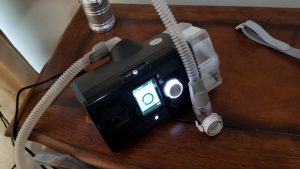
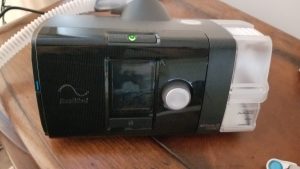
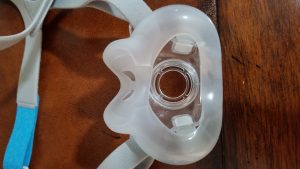
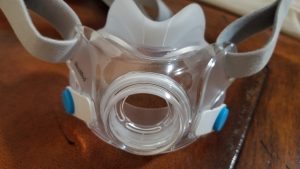 A CPAP is the most effective device for sleep apnea according to Physicians. Forced air is pushed through a machine into a mask that you wear at night.
A CPAP is the most effective device for sleep apnea according to Physicians. Forced air is pushed through a machine into a mask that you wear at night.
There are over 20 styles of masks that you can choose from, but most of them will fit over your nose and mouth.
https://www.webmd.com/sleep-disorders/sleep-apnea/mouth-devices-for-sleep-apnea#1
SNORE GUARD When you have Dental Signs of Sleep Apnea
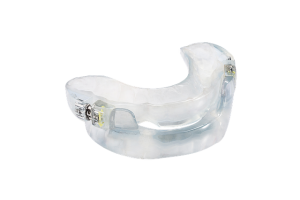
Snore guards work by pulling the lower jaw forward, which helps prevent the jaw from falling backward which would normally close the airway space. This allows easier breathing during the night for the patient.
Because this device is worn on your teeth, it should be worn nightly. If not worn nightly, your teeth may shift over time, and it won’t fit comfortably.
For More Information on Sleep Apnea
American Association For Sleep Apnea
Links You may find Useful
What are some Common Dental Signs of Sleep Apnea?
Some common Dental signs of people with sleep apnea include cracked or broken teeth, grinding your teeth at night, worn down front and back teeth, or frequent or chronic headaches. If you are experiencing any of these dental issues, you should contact your Physician or Dentist to get tested for sleep apnea.
Can a dentist diagnose you for sleep apnea?
Although Dentists can not officially diagnose sleep apnea, they can be incredibly helpful in referring to those with possible airway issues to those that can help diagnose Sleep apnea. Your Physician or Dentist may want you to participate in a sleep study, which will measure the amount of oxygen you're receiving per night using a pulse oximeter.
Is snoring a sign of Sleep Apnea?
If you are experiencing snoring, you may have Sleep apnea. Are you experiencing Jaw Pain when you wake up in the morning? Has anyone ever told you that you snore or are you waking up feeling like you really never took a nap at all? Do you get up more than once a night to go to the restroom ? And is it difficult concentrating during the day because you feel tired.
What is the biggest risk factor for Sleep Apnea?
Overweight(Most common Cause of Sleep Apnea) You are at a higher risk of developing sleep apnea if you are overweight because your throat and tongue will relax which will end up blocking your airway. This prevents your breathing, and can lead to death.
What are the risk factors for Sleep Apnea?
Alcohol Consumption Large Tonsils Being a Male Hypothyroidism Overweight(Most common Cause of Sleep Apnea) You are at a higher risk of developing sleep apnea if you are overweight because your throat and tongue will relax which will end up blocking your airway. This prevents your breathing, and can lead to death. Age(being over 60 years old) Narrow airway High Blood Pressure Smoking Diabetes Family History of Sleep Apnea
What is the association of Sleep Apnea And Tooth Decay
Since people with sleep apnea are gasping for air, their mouth is constantly being exposed to air. This causes your mouth to get dry, and your protective saliva is no longer being used to protect your teeth. A balanced PH in your mouth is usually 7. When your mouth PH goes below 5.5, you become susceptible to Cavities. This can happen when your mouth dries out from Sleep Apnea, snoring, medications, etc.
What is a CPAP used for?
The CPAP is using forced air to help you breathe, and some people would argue that you will develop Cavities from the forced air drying out your mouth.
How can I prevent Dry Mouth and Cavities while using a CPAP?
The way to prevent the dryness of the mouth while using the CPAP is to use the humidifier that your machine comes with. The humidifier will provide moisture and prevent the drying of the mouth, and help prevent cavities. Another solution is to get FL varnish when you go to the DDS in order to strengthen the enamel and Dentin of your teeth.
Whats the most effective treatment for Sleep Apnea?
A CPAP is the most effective device for sleep apnea according to Physicians. Forced air is pushed through a machine into a mask that you wear at night.
How does a Snore Guard help with Sleep Apnea?
Snore guards work by pulling the lower jaw forward, which helps prevent the jaw from falling backward which would normally close the airway space. This allows easier breathing during the night for the patient. Because this device is worn on your teeth, it should be worn nightly. If not worn nightly, your teeth may shift over time, and it won't fit comfortably.